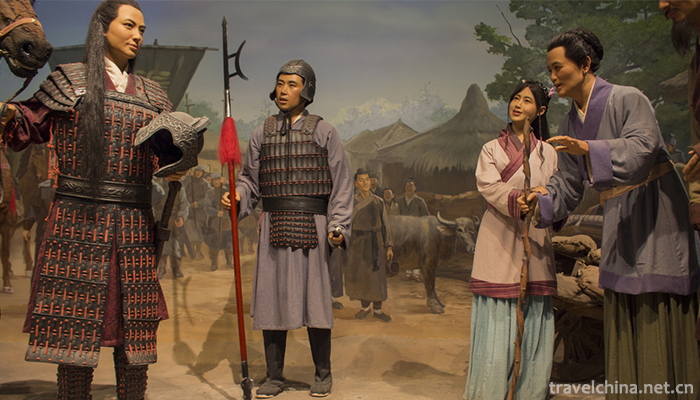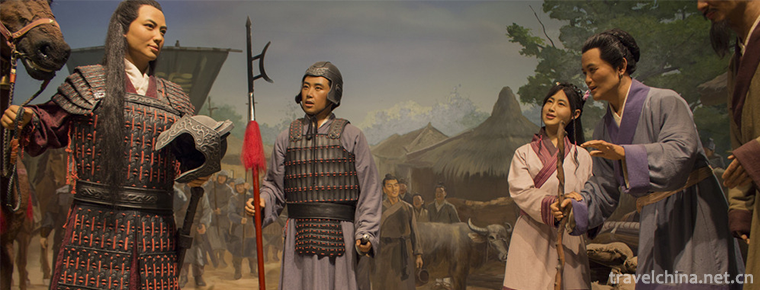Mulan Legend Hua Mulan Legend
Mulan Legend Hua Mulan Legend
Mulan legend, Yucheng City, Shangqiu City, Henan Province, and Huangpi District, Wuhan, Hubei Province, is one of the national intangible cultural heritage.
Mulan legend is one of the Chinese folklores. Mulan legend began in Sui and Tang Dynasty. It is characterized by the spread of Chinese folk oral language in the early period, and then by the appearance of complete and concise written forms. There are nine plots. The story has been handed down from the Sui Dynasty to the present. It contains more than a thousand years of historical information in various historical stages, involving ethics, folklore, religion, literature, art and other aspects. It is of great historical research value.
On June 7, 2008, Mulan Legend was approved by the State Council to be included in the second batch of national intangible cultural heritage list, numbered I-50.
Background of declaration
In March 2007, the Mulan Legend declared by Yucheng County of Shangqiu City was listed as the first batch of Henan Province-level intangible cultural heritage.
On May 22, 2007, the Chinese Association of Folk Literary and Artists made a decision to officially name Yucheng County as the "Town of Mulan in China", and agreed to establish the "Mulan Culture Research Center of China" in Yucheng County of Shangqiu City.
On June 6, 2007, Mulan Legend declared by Huangpi County of Wuhan City was listed as the first batch of intangible cultural heritage in Hubei Province.
In November 2007, Huangpi County began to declare Mulan Legend to the National Committee of Experts on the Protection of Intangible Cultural Heritage.
On June 7, 2008, the Mulan Legend jointly declared by Huangpi District of Wuhan, Hebei Province and Yucheng County of Shangqiu City, Henan Province, was approved by the State Council and listed in the second batch of national intangible cultural heritage list and publicized.
On June 14, 2008, Mulan Legend declared by Huangpi County, Hubei Province, was included in the second batch of national intangible cultural heritage list.
historical origin
The story of Mulan Legend originated in Sui and Tang Dynasty. The Mulan Ci in Guyuefu was written by Li Pharmacist, the national teacher in the early Tang Dynasty. This period is the primary period, and it is characterized by the spread of early folk oral language. Since then, it has been characterized by complete and concise writing. Finally, the main features are the comprehensive interpretation of Mulan's ideological connotation and the diversification of its manifestations. The Song, Yuan, Ming and Qing Dynasties are the period of evolution, with the further emphasis and enrichment of Mulan's ideological and ethical connotation and the more literary and artistic transformation of Mulan's image as the main features. In modern times, it is a period of development, characterized by highlighting the noble spirit of Mulan's thoughts and feelings. The contemporary era is a period of change, with Mulan legend as a traditional human resource as the main feature.
Story content
Dispute over surnames
The story of Hua Mulan has a long history and has been well-known for more than a thousand years. However, there are still many legends about her family name, Liju and birth age.
About her surname, some people say it is Wei (Daming Unified Records, Daqing Unified Records, Henan Tongzhi, Guide Fu Zhi, Shangqiu County Zhi, Yucheng County Zhi, Bozhou Zhi, Wanxian Zhi, etc.); others say it is Mulan; others say it is Zhu (Qing Dynasty's Biography of Loyalty, Filial Piety and Wonderful Woman, the True Book of Salvation of General Mulan Zhongli).
This surname of Mulan is commonly known in the folk. There are three possibilities: one is that Mulan is a kind of flower name, which is inverted from Mulan; the other is that Mulan is called "Hua Gu", which is the nickname of Mulan; and the biggest one is the miscellaneous drama "Four Sounds of Apes" written by Xu Wei, a dramatist of the Ming Dynasty.
The title of a play in "Four Voices of Apes" is "Female Magnolia Entering the Army on behalf of Her Father". The plot of this play came from the Romance of Mulan Ci in Yuefu Poetry Collection of the Northern Song Dynasty, but Mulan has no surname in Mulan Ci. For the need of theatrical performance, Xu Wei gave Mulan a "flower" surname, highlighting the female beauty of Mulan. He also named Mulan's father "flower arc". In fact, the so-called "flower arc" is the homonym of "flower vague", implying the meaning of vague names, which is a common method used by writers.
Later, Mei Lanfang, a master of Peking Opera, adapted Mulan to join the army. He was more cautious at that time, and did not add his surname to Mulan when it was difficult to access information. Until after liberation, Chang Xiangyu, an artist of Henan Opera, adapted the Beijing Opera "Mulan Entering the Army" into Henan Opera, named "Hua Mulan", and toured the country. She also made movies, which had a wide influence. So far, the term "Hua Mulan" has been well known among the people, and it has spread widely, which makes people really mistake Mulan as "Hua".
Household Registration in the 1990s
As for the age of Hua Mulan's birth, Cheng Damao in the Song Dynasty said she was from the early Tang Dynasty in Yan Fanlu. Yao Ying in the Qing Dynasty said that she was from Emperor Xiaowen in the Northern Wei Dynasty to Emperor Xuanwu in Yingguo Town, Gushu County (now Shangqiu Yucheng County); Song Xiangfeng's Guoting Lu in the Qing Dynasty and Guide Fu Zhi and Bozhou Zhi recorded that she was from Emperor Gongdi in the Sui Dynasty. Huangpi County Chronicle records that she was born in Zhenguan of Tang Dynasty.
"Henan Tongzhi", "Guide Fu Zhi" and "Bozhou Zhi" all said that she was from Yingguo Town, Gushu County, Songzhou in the Sui Dynasty, and Lu Kun in the Ming Dynasty recorded in "Boudoir Fantu Shuo" "Mulan, Shangqiu people." The Records of the Unification of the Qing Dynasty said that she was from Dongwei Village in Xuxian County. The Qing Dynasty "Bozhou Chronicle" Volume 1 Geographic Records: "The Yuan Dynasty has a statue of a filial piety general temple, the general's name Mulan, Bozhi people. Suiyang is eighty miles southeast of the border. It is called Yingguo, the ancient Bofang area and the ruins of filial piety. Guo Jinyingguo is Yingguoji, seventy miles southeast of Shangqiu. Hou You thought that the ancient Bo area, the ruins of filial piety, filial piety to the people. And the former residence here, we can see that Yingguo's land belongs to Shangqiu, which used to belong to banishment.
The Qing Dynasty novel The Story of Loyalty, Filial Piety, bravery and Woman claims that Mulan was a native of Xiling County, Huangzhou Prefecture in the Tang Dynasty.
Inheritance value
The main value of Mulan Legend lies in: Firstly, the story has been handed down from Sui Dynasty to the present. It contains information of various historical stages in China for more than a thousand years, involving ethics, folklore, religion, literature, art and other aspects, and has precious historical research value.
Secondly, the story has been made into one of the oldest classical legends in China for thousands of years, and it has been continuously supplemented and innovated while spreading. It has the open quality of keeping pace with the times for refining, rich in excellent ideological resources for excavation, and contains many successful creative experiences for reference. While prospering our literary and artistic creation, it can be endowed with the requirements of the times. Its new ideological connotation makes it serve the contemporary construction of "three civilizations".
Thirdly, the spirit of "loyalty, filial piety and bravery" praised by Mulan legend, which centers on the feelings of home and country, is of great practical significance in today's construction of socialist spiritual civilization and socialist harmonious society. As a folk literary and artistic work, it developed and matured in Huangpi's unique historical and cultural atmosphere. It not only highlighted the theme of "loyalty, filial piety and bravery festival", but also thrilled and amazing. It spread to all parts of the country through various artistic creations such as rap, opera, film and television, and had a wide and far-reaching impact.


-
1.Hakka stuffed tofu
Hakka-brewed tofu, also known as minced meat-brewed tofu and Dongjiang-brewed tofu, is one of Hakka's famous dishes and is said to be related to...
Time 2018-11-02 -
2.Chengdu JinJiang Hotel
Jinjiang Hotel is the first five-star hotel in southwest China. It is located in Renmin South Road, the main road of Chengdu City, adjacent to the famous Funan River and echoes Tianfu Square
Time 2018-12-16 -
3.The Grand View Garden Area of Shanghai
Shanghai Grand View Garden is located at 701 Qingshang Highway, Qingpu District, Shanghai. It is situated on the west side of Dianshan Lake, 65 kilometers away from downtown Shanghai.
Time 2018-12-19 -
4.Guangdong Marine Silk Road Museum
The Guangdong Marine Silk Road Museum is located on the "Shili Silver Beach" of Hailing Island Experimental Development Zone, Yangjiang City, Guangdong Province. The total construction area
Time 2019-01-13 -
5.Legend of Eight Immortals
The legend of Eight Immortals is one of the local folklores in Shandong Province. The legend of Eight Immortals originated very early. The legend of "Eight Immortals Crossing the Sea, Each Showin
Time 2019-04-02 -
6.Rice custom
Wannian rice custom and Shangrao Wannian County custom are cultural heritage. Wannian is the "land of rice". The traditional rice custom has been passed down in this area for thousands of ye
Time 2019-04-26 -
7.Legend of Mount Tai
Taishan legend is one of the folk legends in Shandong Province. According to legend, the history of the Theocracy of Taishan God in charge of life and death can be traced back to the pre-Qin period. A
Time 2019-06-18 -
8.Legend of the Temple of Heaven
On May 18, 2010, the Ministry of Culture of China announced the third batch of national intangible cultural heritage list of recommended projects (new entries). The first item in the category of folk
Time 2019-06-21 -
9.Uygur Residential Architecture Skills Aiwan Sailai Residential Construction Skills
Uygur Aiwan Sailai dwellings are mainly distributed in towns and villages along the desert edge of the Tarim Basin, especially in Yutian, Moyu, Minfeng, Pishan, Hetian, Shache and Kashgar along the so
Time 2019-06-26 -
10.Shaoshutun and Munona
Manmaisankang National AAA Scenic Area, where every day the love story between Zhaoshu Tun and the Peacock Princess Munona, beautiful music, more than 100 peacocks falling from the sky, the beautiful
Time 2019-07-25 -
11.Mineral resources in Neijiang
Neijiang City is rich in mineral resources. Energy minerals mainly include coal, natural gas and oil shale; nonmetal and building materials minerals include limestone, sandstone, shale, refractory clay, bauxite, marble, river sand, gravel and ceramic clay, etc.;
Time 2020-12-16 -
12.Neijiang folk culture
Bull lantern dance is popular in Yuexi. One dressed as a shepherd boy and two dressed as cattle with cow shaped props. In the sound of gongs and drums, the shepherd boy first said doggerel to the audience to express the festival's congratulations, and then
Time 2020-12-16